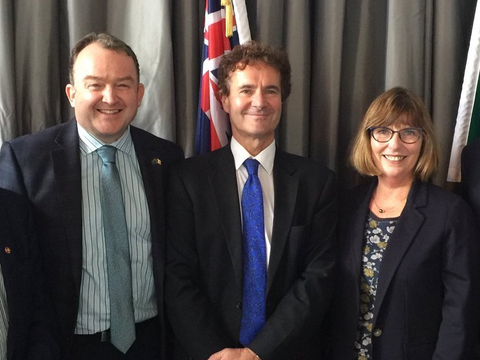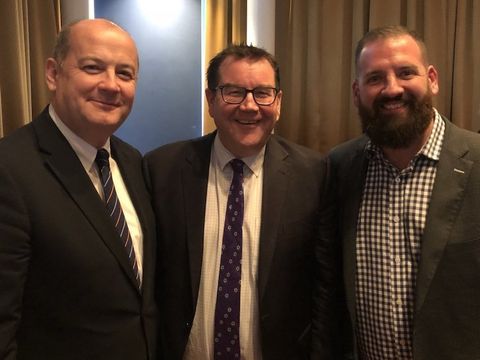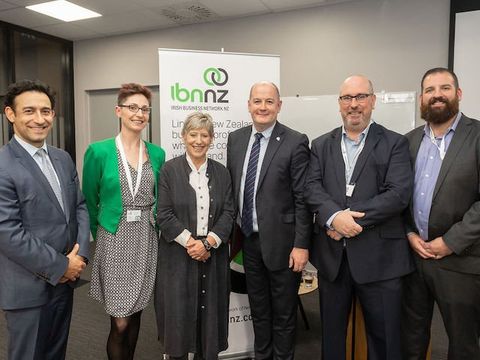Informal Networks
Rodney Walshe, the first Honorary Consul General to New Zealand likes to joke that he has lived in New Zealand longer than 70 per cent of the population.
He emigrated from Dublin in 1960 at the age of 24 and worked with General Motors. That job took him all over the North Island visiting car dealers. Along the way he spread the gospel of all things Irish.
“My Dublin accent was a distinguishing factor and got me a foot in the door,” says Walshe. “There weren’t as many Irish here in the 1960’s as there are now so I was a bit of a novelty. But even back then there was a natural empathy between Kiwis and the Irish.”
At 29, Walshe became the managing director of Fletcher Merchants building supply company.
“One of the managers at Fletchers said to me, ‘You’re the first educated Irishman I’ve met in New Zealand.’ He was used to dealing with the manual labourers who worked for Fletchers. I told him, ‘a lack of education does not mean a lack of intelligence.’ So many of those Irish labourers and construction workers went on to run very successful companies and employ hundreds and thousands of New Zealanders.”
"The Irish have a strong, deep culture that binds people together" - Treza Gallogly
Treza Gallogly’s father emigrated from Ireland and she grew up with the Irish community and listened to their stories at the Irish Society.
“In the early days, Irish people came to New Zealand by boat,” says Gallogly. “They'd arrive in Wellington and relatives from around the country would come and pick them up. The Irish tended to stick together because they were so far from home and had little or no communication with their families back in Ireland. The Irish Society became their family.”
“Emigrants to a new country tend to look out for each other. It's a natural inclination but the Irish are particularly good at it. The Irish have a strong, deep culture that binds people together and the Irish Society was where people met and socialised.”
“There were no Irish pubs in Auckland back then. If you were fresh off the boat in Auckland you went to Gleeson’s pub in town where you were guaranteed to meet someone you knew or a friend of a friend. That's where people found jobs and construction workers were paid their wages.
“So there were these very informal networks 70 or 80 years ago. Those Irish people helped build New Zealand roads and infrastructure and gave a lot back to society. For a long time, Irish people were associated with the construction industry but they've become much more upwardly mobile and professional in recent years.”
In the early 1970’s, Rodney Walshe started working in the travel industry and in 1976 he went out on his own and set up The Walshe Group, a travel industry company. That same year, he was appointed Honorary Consul General for Ireland.
“There was nobody promoting Ireland as a tourist destination back then so I offered to represent Bord Fáilte (now Tourism Ireland) in New Zealand. My job was marketing and promoting Ireland as a destination and that put me in touch with a lot of Irish people as well as Kiwis.”
“I used to speak at Rotary events and talk about the history of Ireland and the similarities between our two countries. I went out of my way to change the perspective of Irish people in New Zealand from the ‘pick and shovel man’ to a more professional image. I don’t know if what I was doing was networking. I was a connector and because I was travelling around the country in my job I knew a lot of people.”
In his role as Honorary Consul, Walshe became deeply involved with the Irish society and community in New Zealand.
“There were lots of Irish societies scattered around New Zealand at the time but for me the Irish Society was largely tied to the past,” recalls Walshe. “There were a lot of genuine, lovely people in the Irish Society but a lot of them were forced to come to New Zealand for economic reasons without any prospect of getting back home again. That wasn’t my reality and it wasn’t the case for a lot of young Irish professionals who started emigrating to New Zealand in big numbers in the 1970s and 80s.”
“I met a lot of Irish people who didn't want to live in the past but they didn't want to forget their Irish roots either. One thing we tend to overlook now is The Troubles in Northern Ireland. Consciously or subconsciously it was a big barrier to trade and progress in Ireland in the 1980s and 90s.”
Niamh McMahon arrived in New Zealand in the early 1980s.
“When I arrived there was nothing for young Irish people to get involved with apart from the Irish Society, which wasn’t for me,” she says.
“I wasn't hostile to the Irish Society but I was never interested in Irish music or Irish dancing. The makeup of the Irish Society reflected a much older generation, who had made very valuable contributions to the community but had a very romantic, traditional view of Ireland. They also had very entrenched views on the North and the Troubles.”
“I really felt when I came here that I was leaving behind things about Ireland that I didn't like. I didn't want to replicate Ireland here in New Zealand. I wanted to give it a proper go and to do that I felt I had to live like a local.”
McMahon became friends with Rodney Walshe who asked if she could use her legal skills to help Irish citizens in distress.
“If any Irish person here needed a hand or had a problem, I did pro bono work for them,” says McMahon. “My engagement with Irish people in New Zealand grew as a result of that and subsequently with the formation of The Lansdowne Club. Over time the face of the Irish emigrant to New Zealand changed. Irish people came to New Zealand for a career move or a lifestyle change.”
“Rodney and I had our finger on the pulse and knew who was who in the zoo. Rodney had a team of professionals around him who provided the kind of expertise and relationships that the Irish Business Network of New Zealand (IBNNZ) offers now on a more formal basis. Those kinds of relationships and referrals weren't always explicit but they were examples of unofficial networks or ‘soft power’ I suppose.”
The Lansdowne Club was founded in Sydney in 1986 by a group of Irish born business people including Kingsley Aikins. In 1989, Aikins suggested to Oliver Lee, an Irishman who was moving from Australia to New Zealand, that it might be a good idea to start something similar in Auckland. Lee met with Rodney Walshe who introduced him to Patrick Flynn and Liam Cogan and together they started the Lansdowne Club in Auckland in 1990.
“It was a very social network that met a few times a year for dinner with a speaker or two,” recalls Lee. “We built the network to a couple of hundred people and there were a lot of people who came to the Lansdowne Club who weren't members of the Irish Society or involved with the GAA. It was a great way for new emigrants to New Zealand to meet like-minded people.”
“I was involved at the start, the middle, and the end of the Lansdowne Club,'' says Niamh McMahon. “Oliver was the last man standing and he invested a lot of himself into it. He did a great job of corralling people but when an organisation is based on one person it can’t last.Still, it did a lot of good while it lasted. It brought a lot of people together and I made friends for life through it.”
The Lansdowne Club lasted for over 20 years before it folded in 2014. “I realised it had done its dash,” says Oliver Lee.






